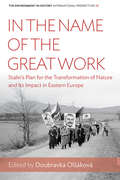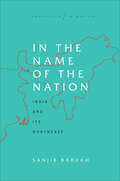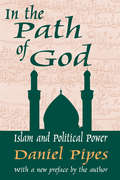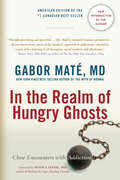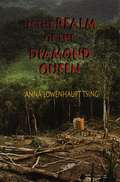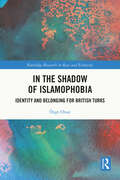- Table View
- List View
In the Name of Womens Rights: The Rise of Femonationalism
by Sara R. FarrisSara R. Farris examines the demands for women's rights from an unlikely collection of right-wing nationalist political parties, neoliberals, and some feminist theorists and policy makers. Focusing on contemporary France, Italy, and the Netherlands, Farris labels this exploitation and co-optation of feminist themes by anti-Islam and xenophobic campaigns as “femonationalism.” She shows that by characterizing Muslim males as dangerous to western societies and as oppressors of women, and by emphasizing the need to rescue Muslim and migrant women, these groups use gender equality to justify their racist rhetoric and policies. This practice also serves an economic function. Farris analyzes how neoliberal civic integration policies and feminist groups funnel Muslim and non-western migrant women into the segregating domestic and caregiving industries, all the while claiming to promote their emancipation. In the Name of Women's Rights documents the links between racism, feminism, and the ways in which non-western women are instrumentalized for a variety of political and economic purposes.
In the Name of the Great Work: Stalin's Plan for the Transformation of Nature and its Impact in Eastern Europe (Environment in History: International Perspectives #10)
by Doubravka OlšákováBeginning in 1948, the Soviet Union launched a series of wildly ambitious projects to implement Joseph Stalin’s vision of a total “transformation of nature.” Intended to increase agricultural yields dramatically, this utopian impulse quickly spread to the newly communist states of Eastern Europe, captivating political elites and war-fatigued publics alike. By the time of Stalin’s death, however, these attempts at “transformation”—which relied upon ideologically corrupted and pseudoscientific theories—had proven a spectacular failure. This richly detailed volume follows the history of such projects in three communist states—Poland, Hungary, and Czechoslovakia—and explores their varied, but largely disastrous, consequences.
In the Name of the Nation: India and Its Northeast (South Asia in Motion)
by Sanjib BaruahIn India, the eight states that border Myanmar, Bangladesh, Bhutan and the Tibetan areas of China are often referred to as just "the Northeast." In the Name of the Nation offers a critical and historical account of the country's troubled relations with this borderland region. Its modern history is shaped by the dynamics of a "frontier" in its multiple references: migration and settlement, resource extraction, and regional geopolitics. Partly as a result of this, the political trajectory of the region has been different from the rest of the country. Ethnic militias and armed groups have flourished for decades, but they coexist comfortably with functioning electoral institutions. The region has some of India's highest voter turnout rates, but special security laws produce significant democracy deficits that are now almost as old as the Republic. That these policies have been enforced to foment national unity while multiple alternative conceptions of the "nation" animate politics in the region forces us to reflect on the very foundations of the nation form. Sanjib Baruah offers a nuanced account of this impossibly complicated story, asking how democracy can be sustained, and deepened, in these conditions.
In the Nature of Cities: Urban Political Ecology and the Politics of Urban Metabolism (Questioning Cities)
by Nik Heynen Maria Kaika Eric SwyngedouwThe social and material production of urban nature has recently emerged as an important area in urban studies, human/environmental interactions and social studies. This has been prompted by the recognition that the material conditions that comprise urban environments are not independent from social, political, and economic processes, or from the cultural construction of what constitutes the ‘urban’ or the ‘natural’. Through both theoretical and empirical analysis, this groundbreaking collection offers an integrated and relational approach to untangling the interconnected processes involved in forming urban landscapes. The essays in this book attest that the re-entry of the ecological agenda into urban theory is vital both in terms of understanding contemporary urbanization processes, and of engaging in a meaningful environmental politics. They debate the central themes of whose nature is, or becomes, urbanized, and the uneven power relations through which this socio-metabolic transformation takes place. Including urban case studies, international research and contributions from prominent urban scholars, this volume will enable students, scholars and researchers of geographical, environmental and urban studies to better understand how interrelated, everyday economic, political and cultural processes form and transform urban environments.
In the Next Room (or the vibrator play)
by Sarah Ruhl"A fascinating, funny and evocative play. . . . Ruhl develops the story with the enticing blend of irreverent humor and skewed realism. . . . It's beautiful." -San Francisco Chronicle"[This] breathtakingly inventive addition to Ruhl's singular body of work . . . has the potential to be a modern masterpiece."-Los Angeles TimesSarah Ruhl made her Broadway debut this fall with her latest effervescent comedy: a play about sex, intimacy, and equality, set in the 1880s, when enthusiasm for the electric light bulb gave rise to a handy new instrument to treat female hysteria. The story revolves around the medical office and home of Dr. Givings, who regularly induces "paroxysm" in his once high-strung patient Sabrina, allowing her to happily return to playing piano. Soon, Sabrina falls in love with the doctor's assistant Annie, and also befriends his wife Catherine, who is dealing with her own neurotic misgivings about not being able to breast-feed her baby. With this new work, Ruhl once again uses playful symbolism and lyrical language as she makes seemingly effortless thematic leaps--crafting a play with tremendous critical and audience appeal, in her singular theatrical voice.Sarah Ruhl's plays include Dead Man's Cell Phone, The Clean House (a Pulitzer Prize finalist), Passion Play, and Eurydice, all of which have been widely produced throughout the United States and internationally. She is a recipient of the MacArthur Fellowship.
In the Palace of Nezahualcoyotl
by Eduardo De J. DouglasAround 1542, descendants of the Aztec rulers of Mexico created accounts of the pre-Hispanic history of the city of Tetzcoco, Mexico, one of the imperial capitals of the Aztec Empire. Painted in iconic script ("picture writing"), the Codex Xolotl, the Quinatzin Map, and the Tlohtzin Map appear to retain and emphasize both pre-Hispanic content and also pre-Hispanic form, despite being produced almost a generation after the Aztecs surrendered to Hernán Cortés in 1521. Yet, as this pioneering study makes plain, the reality is far more complex. Eduardo de J. Douglas offers a detailed critical analysis and historical contextualization of the manuscripts to argue that colonial economic, political, and social concerns affected both the content of the three Tetzcocan pictorial histories and their archaizing pictorial form. As documents composed by indigenous people to assert their standing as legitimate heirs of the Aztec rulers as well as loyal subjects of the Spanish Crown and good Catholics, the Tetzcocan manuscripts qualify as subtle yet shrewd negotiations between indigenous and Spanish systems of signification and between indigenous and Spanish concepts of real property and political rights. By reading the Tetzcocan manuscripts as calculated responses to the changes and challenges posed by Spanish colonization and Christian evangelization, Douglas's study significantly contributes to and expands upon the scholarship on central Mexican manuscript painting and recent critical investigations of art and political ideology in colonial Latin America.
In the Path of Allah: 'Umar, An Essay into the Nature of Charisma in Islam'
by John Ralph WillisA West African Sufi and religious reformer (c.1794-1864), struggled to reconcile the temporal achievements of his jihad with his mystical calling. The fame of Shaykh Omar rested on his reputation as a worker of miracles, and the success of jihad in his path to Allah.
In the Path of God: Islam and Political Power
by Daniel PipesAmericans' awareness of Islam and Muslims rose to seemingly unprecedented heights in the immediate aftermath of September 11, 2001, but this is not the first time they have dominated American public life. Once before, during the period of the Iranian revolution and hostage crisis of 1979 to 1981, Americans found themselves targeted as a consequence of a militant interpretation of Islam. Daniel Pipes wrote In the Path of God in response to those events, and the heightened interest in Islam they generated. His objective was to present an overview of the connection between in Islam and political power through history in a way that would explain the origins of hostility to Americans and the West. Its relevance to our understanding of contemporary events is self evident. Muslim antagonism toward the West is deeply rooted in historical experience. In premodern times, the Islamic world enjoyed great success, being on the whole more powerful and wealthier than their neighbors. About two hundred years ago, a crisis developed, as Muslims became aware of the West's overwhelming force and economic might. While they might have found these elements attractive, Muslims found European culture largely alien and distasteful. The resulting resistance to Westernization by Muslims has deep roots, has been more persistent than that of other peoples, and goes far to explain the deep Muslim reluctance to accept modern ways. In short, Muslims saw what the West had and wanted it too, but they rejected the methods necessary to achieve this. This, the Muslim trauma, has only worsened over the years.
In the Path of the Masters: Understanding the Spirituality of Buddha, Confucius, Jesus, and Muhammad
by Denise Lardner Carmody John Tully CarmodyReflecting on the legacy of four great religious figures, this book places each in their historical context, offers glimpses of what they were like personally, assesses how they saved their followers from confusion, and traces each religious tradition after its founder's death.
In the President's Secret Service: Behind the Scenes with Agents in the Line of Fire and the Presidents They Protect
by Ronald KesslerNever before has a journalist penetrated the wall of secrecy that surrounds the U.S. Secret Service, that elite corps of agents who pledge to take a bullet to protect the president and his family. After conducting exclusive interviews with more than one hundred current and former Secret Service agents, bestselling author and award-winning reporter Ronald Kessler reveals their secrets for the first time.Secret Service agents, acting as human surveillance cameras, observe everything that goes on behind the scenes in the president's inner circle. Kessler reveals what they have seen, providing startling, previously untold stories about the presidents, from John F. Kennedy and Lyndon Johnson to George W. Bush and Barack Obama, as well as about their families, Cabinet officers, and White House aides. Kessler portrays the dangers that agents face and how they carry out their missions-from how they are trained to how they spot and assess potential threats. With fly-on-the-wall perspective, he captures the drama and tension that characterize agents' lives.In this headline-grabbing book, Kessler discloses assassination attempts that have never before been revealed. He shares inside accounts of past assaults that have put the Secret Service to the test, including a heroic gun battle that took down the would-be assassins of Harry S. Truman, the devastating day that John F. Kennedy was killed in Dallas, and the swift actions that saved Ronald Reagan after he was shot.While Secret Service agents are brave and dedicated, Kessler exposes how Secret Service management in recent years has betrayed its mission by cutting corners, risking the assassination of President Barack Obama, Vice President Joe Biden, and their families. Given the lax standards, "It's a miracle we have not had a successful assassination," a current agent says.Since an assassination jeopardizes democracy itself, few agencies are as important as the Secret Service-nor is any other subject as tantalizing as the inner sanctum of the White House. Only tight-lipped Secret Service agents know the real story, and Ronald Kessler is the only journalist to have won their trust.From the Hardcover edition.
In the Realm of Hungry Ghosts: Close Encounters with Addiction
by Peter A. Levine Gabor MateBased on Gabor Maté's two decades of experience as a medical doctor and his groundbreaking work with the severely addicted on Vancouver's skid row, In the Realm of Hungry Ghosts radically reenvisions this much misunderstood field by taking a holistic approach. Dr. Maté presents addiction not as a discrete phenomenon confined to an unfortunate or weak-willed few, but as a continuum that runs throughout (and perhaps underpins) our society; not a medical "condition" distinct from the lives it affects, rather the result of a complex interplay among personal history, emotional, and neurological development, brain chemistry, and the drugs (and behaviors) of addiction. Simplifying a wide array of brain and addiction research findings from around the globe, the book avoids glib self-help remedies, instead promoting a thorough and compassionate self-understanding as the first key to healing and wellness. In the Realm of Hungry Ghosts argues persuasively against contemporary health, social, and criminal justice policies toward addiction and those impacted by it. The mix of personal stories--including the author's candid discussion of his own "high-status" addictive tendencies--and science with positive solutions makes the book equally useful for lay readers and professionals.From the Trade Paperback edition.
In the Realm of Nachan Kan
by Marilyn Masson"The prevailing view of the lowland Maya during the Postclassic period (A.D. 1050-1500) has been one of an impoverished, ""degenerated"" society devoid of cultural accomplishment. However, Marilyn A. Masson offers a fresh interpretation of this society as one that represented a complex, sophisticated, extensive organization of semiautonomous units that were closely integrated, yet embraced a decentralized political economy.In the Realm of Nachan Kan opens a window on Postclassic Maya patterns of cultural development and organization through a close examination of the small rural island of Laguna de On, a location that was distant from the governing political centers of the day. Using diachronic analysis of regional settlement patterns, ceramic traditions, household and ritual features, and artifacts from the site, Masson tracks developmental changes throughout the Postclassic period. These data suggest that affluent patterns of economic production and local and long-distance exchange were established within northern Belize by the eleventh century, and continued to develop, virtually uninterrupted, until the time of Spanish arrival.In addition, Masson analyzes contemporary political and religious artistic traditions at the temples of Mayapan, Tulum, and Santa Rita to provide a regional context for the changes in community patterns at Laguna de On. These cultural changes, she maintains, are closely correlated with the rise of Mayapan to power and participation of sites like Laguna de On in a pan-lowland economic and ritual interaction sphere. Offering a thoroughly new interpretation of Postclassic Mayan civilization. In the Realm of Nachan Kan is a must for scholars of Mesoamerican history and culture."
In the Realm of the Diamond Queen: Marginality in an Out-of-the-Way Place
by Anna Lowenhaupt TsingIn this highly original and much-anticipated ethnography, Anna Tsing challenges not only anthropologists and feminists but all those who study culture to reconsider some of their dearest assumptions. By choosing to locate her study among Meratus Dayaks, a marginal and marginalized group in the deep rainforest of South Kalimantan, Indonesia, Tsing deliberately sets into motion the familiar and stubborn urban fantasies of self and other. Unusual encounters with her remarkably creative and unconventional Meratus friends and teachers, however, provide the opportunity to rethink notions of tradition, community, culture, power, and gender--and the doing of anthropology. Tsing's masterful weaving of ethnography and theory, as well as her humor and lucidity, allow for an extraordinary reading experience for students, scholars, and anyone interested in the complexities of culture. Engaging Meratus in wider conversations involving Indonesian bureaucrats, family planners, experts in international development, Javanese soldiers, American and French feminists, Asian-Americans, right-to-life advocates, and Western intellectuals, Tsing looks not for consensus and coherence in Meratus culture but rather allows individual Meratus men and women to return our gaze. Bearing the fruit from the lively contemporary conversations between anthropology and cultural studies, In the Realm of the Diamond Queen will prove to be a model for thinking and writing about gender, power, and the politics of identity.
In the Realm of the Diamond Queen: Marginality in an Out-of-the-Way Place
by Anna Lowenhaupt TsingIn this highly original and much-anticipated ethnography, Anna Tsing challenges not only anthropologists and feminists but all those who study culture to reconsider some of their dearest assumptions. By choosing to locate her study among Meratus Dayaks, a marginal and marginalized group in the deep rainforest of South Kalimantan, Indonesia, Tsing deliberately sets into motion the familiar and stubborn urban fantasies of self and other. Unusual encounters with her remarkably creative and unconventional Meratus friends and teachers, however, provide the opportunity to rethink notions of tradition, community, culture, power, and gender--and the doing of anthropology. Tsing's masterful weaving of ethnography and theory, as well as her humor and lucidity, allow for an extraordinary reading experience for students, scholars, and anyone interested in the complexities of culture.Engaging Meratus in wider conversations involving Indonesian bureaucrats, family planners, experts in international development, Javanese soldiers, American and French feminists, Asian-Americans, right-to-life advocates, and Western intellectuals, Tsing looks not for consensus and coherence in Meratus culture but rather allows individual Meratus men and women to return our gaze. Bearing the fruit from the lively contemporary conversations between anthropology and cultural studies, In the Realm of the Diamond Queen will prove to be a model for thinking and writing about gender, power, and the politics of identity.
In the Restaurant: Society in Four Courses
by Jamie Lee Searle Christoph RibbatThe deliciously cosmopolitan story of the restaurant from eighteenth-century Paris to El BulliWhat does eating out tell us about who we are? The restaurant is where we go to celebrate, to experience pleasure, to see and be seen - or, sometimes, just because we're hungry. But these temples of gastronomy hide countless stories.As this dazzlingly entertaining, eye-opening book shows, the restaurant is where performance, fashion, commerce, ritual, class, work and desire all come together. Through its windows, we can glimpse the world.This is the tale of the restaurant in all its guises, from the first formal establishments in eighteenth-century Paris serving 'restorative' bouillon, to today's new Nordic cuisine, via grand Viennese cafés and humble fast food joints. Here are tales of cooks who spend hours arranging rose petals for Michelin stars, of the university that teaches the consistency of the perfect shake, of the lunch counter that sparked a protest movement, of the writers - from Proust to George Orwell - who have been inspired or outraged by the restaurant's secrets.
In the Shade of the Sunna: Salafi Piety in the Twentieth-Century Middle East
by Aaron Rock-SingerSalafis explicitly base their legitimacy on continuity with the Quran and the Sunna, and their distinctive practices—praying in shoes, wearing long beards and short pants, and observing gender segregation—are understood to have a similarly ancient pedigree. In this book, however, Aaron Rock-Singer draws from a range of media forms as well as traditional religious texts to demonstrate that Salafism is a creation of the twentieth century and that its signature practices emerged primarily out of Salafis’ competition with other social movements amid the intellectual and social upheavals of modernity. In the Shade of the Sunna thus takes readers beyond the surface claims of Salafism’s own proponents—and the academics who often repeat them—into the larger sociocultural and intellectual forces that have shaped Islam’s fastest growing revivalist movement.
In the Shadow of Billy the Kid: Susan McSween and the Lincoln County War
by Kathleen P. ChamberlainThe events of July 19, 1878, marked the beginning of what became known as the Lincoln County War and catapulted Susan McSween and a young cowboy named Henry McCarty, alias Billy the Kid, into the history books. The so-called war, a fight for control of the mercantile economy of southeastern New Mexico, is one of the most documented conflicts in the history of the American West, but it is an event that up to now has been interpreted through the eyes of men. As a woman in a man&’s story, Susan McSween has been all but ignored. This is the first book to place her in a larger context. Clearly, the Lincoln County War was not her finest hour, just her best known. For decades afterward, she ran a successful cattle ranch. She watched New Mexico modernize and become a state. And she lived to tell the tales of the anarchistic territorial period many times.
In the Shadow of Du Bois: Afro-Modern Political Thought in America
by Robert Gooding-WilliamsThe Souls of Black Folk is Du Bois’s outstanding contribution to modern political theory. It is his still influential answer to the question, “What kind of politics should African Americans conduct to counter white supremacy?” Here, in a major addition to American studies and the first book-length philosophical treatment of Du Bois’s thought, Robert Gooding-Williams examines the conceptual foundations of Du Bois’s interpretation of black politics. For Du Bois, writing in a segregated America, a politics capable of countering Jim Crow had to uplift the black masses while heeding the ethos of the black folk: it had to be a politics of modernizing “self-realization” that expressed a collective spiritual identity. Highlighting Du Bois’s adaptations of Gustav Schmoller’s social thought, the German debate over the Geisteswissenschaften, and William Wordsworth’s poetry, Gooding-Williams reconstructs Souls’ defense of this “politics of expressive self-realization,” and then examines it critically, bringing it into dialogue with the picture of African American politics that Frederick Douglass sketches in My Bondage and My Freedom. Through a novel reading of Douglass, Gooding-Williams characterizes the limitations of Du Bois’s thought and questions the authority it still exerts in ongoing debates about black leadership, black identity, and the black underclass. Coming to Bondage and then to these debates by looking backward and then forward from Souls, Gooding-Williams lets Souls serve him as a productive hermeneutical lens for exploring Afro-Modern political thought in America.
In the Shadow of Ebenezer: A Black Catholic Parish in the Age of Civil Rights and Vatican II
by Leah MickensUncovers how the Civil Rights Movement and Vatican II affected African American Catholics in Atlanta The history and practices of African American Catholics has been vastly understudied, and Black Catholics are often written off as a fringe sector of the religious population. Yet, Catholics of African descent have been a part of Catholicism since the early days of European exploration into the New World.In the Shadow of Ebenezer examines how the Civil Rights Movement and the Second Vatican Council affected African American Catholics in Atlanta, Georgia, focusing on the historic Our Lady of Lourdes Catholic Church in the Old Fourth Ward. Our Lady of Lourdes is a neighbor of major historic Black Protestant churches in the city, including Ebenezer Baptist Church, a block away, which during the Civil Rights era was the pulpit of Martin Luther King Jr. Featuring archival and oral history sources, the book examines the religious and cultural life of the parishioners of Our Lady of Lourdes Catholic Church, showing how this Black Catholic congregation fit into the overall religious ecology of the neighborhood. Examining Our Lady of Lourdes in relation to these larger Black Protestant congregations helps to illuminate whether and how they were shaped by their place at a center of the civil rights struggle, and how religious change and social change intersect.
In the Shadow of Freedom: A Heroic Journey to Liberation, Manhood, and America
by Tchicaya Missamou Travis SentellFROM POVERTY TO WEALTH, FROM AFRICA TO AMERICA, AND FROM CHILD SOLDIER TO U. S. MARINE Born into the Congolese wilderness, Tchicaya Missamou became a child soldier at age 11. As a horrific civil war loomed across his country, Tchicaya began using his militia connections to ferry jewels, cash, computers, and white diplomats out of the country. By 17, he was rich. By 18, he was a hunted man, his house destroyed, his family brutalized in front of him by his own militia. By 19, he'd left behind everything he'd ever known, escaping to Europe and, eventually, to America. Incredibly, that was only the start of his journey. In the Shadow of Freedom is the uplifting story of one man's quest to achieve the American Dream. Tchicaya Missamou's life is a shining example of why America is a gift that should not be taken for granted, and why we are limited only by the breadth of our imagination and the strength of our will.
In the Shadow of History: Passing of Lineage Society
by Andrew DavidsonFirst Published in 2018. Routledge is an imprint of Taylor & Francis, an Informa company.
In the Shadow of Illness
by Myra Bluebond-LangnerWhat is it like to live with a child who has a chronic, life-threatening disease? What impact does the illness have on well siblings in the family? The author suggests that understanding the impact of the illness lies not in the identifying deficiencies in the lives of those affected, but in appreciating how family members carry on with their lives in the face of the disease's intrusion. She looks at how parents adjust their priorities and their idea of what constitutes a normal life, how they try to balance the needs of other family members while caring for the ill child, and how they see the future. Since the issues raised are not unique to cystic fibrosis but are common to other chronic and life-threatening illnesses, this book will be of interst to all who study, care for, or live with the seriously ill.
In the Shadow of Invisibility: Ralph Ellison and the Promise of American Democracy
by Sterling Lecater Bland Jr.With In the Shadow of Invisibility, Sterling Lecater Bland Jr. offers a long-overdue reconsideration of Ralph Ellison, examining the trajectory of his intellectual thought in relation to its resonances in twenty-first-century American culture. Bland charts Ellison’s evolving attitudes on several central topics including democracy, race, identity, social community, place, and political expression. This compelling new exploration of Ellison’s legacy stresses the perpetual need to reexamine the intersections of race, literature, and American culture, with particular attention to how the democratic principle has grown increasingly urgent in the nation’s ongoing, and often contentious, conversations about race. Arguing that Ellison saw racial and social identity as being inseparable from the nation’s past and its complicated history of racial anxiety, In the Shadow of Invisibility traces the growth and transformation of Ellison’s ideas across his life and work, from his early apprentice writing that culminated in his groundbreaking first novel, Invisible Man, through the posthumous publication of his unfinished second novel, Three Days before the Shooting . . . Focused on his mythic vision of the promise of America, this book firmly situates Ellison in the sociopolitical environments from which his ideas arose, with close consideration of his published writings, including his influential essays on literature and jazz, as well as his working notes and correspondence. Bland foregrounds Ellison’s thinking on the responsibilities of Black writers to examine democratic ideals, the legacies of slavery and Jim Crow, and the impacts of civil rights movements. Interweaving biography, history, and literary criticism, and drawing from extensive archival research, In the Shadow of Invisibility reveals the extent to which Ellison’s work exposes the contradictions inherent in American culture, arguing anew for the importance and immediacy of his writings in the broader context of American intellectual thought.
In the Shadow of Islamophobia: Identity and Belonging for British Turks (Routledge Research in Race and Ethnicity)
by Özge OnayThis book explores the multifaceted experiences of British Turks, particularly focusing on how they navigate and negotiate Islamophobia in contemporary British society. It delves into the complexities of identity, ethnicity, and religion, shedding light on the unique ways in which British Turks respond to and reshape the discourses surrounding Islamophobia. By examining the intersection of Turkish secularism, national identity, and global socio-political dynamics, this book offers a nuanced understanding of how Islamophobia is both experienced and deflected within this community. Through a combination of in-depth interviews, ethnographic insights, and analysis of social discourses, the book highlights how British Turks engage in practices of passing and identity negotiation. It uncovers how these strategies are informed by broader themes such as Brexit, cosmopolitanism, and the legacy of Turkey’s relationship with Europe. This study challenges monolithic interpretations of Islamophobia, presenting a more diverse and intricate portrayal of its impact on different Muslim communities.This book is an essential resource for scholars and students of Sociology, Criminology, Cultural Studies, and Religious Studies, as well as policymakers and practitioners working in multicultural and multi-ethnic contexts. It will be of particular interest to those studying the intersections of race, religion, and identity in the Middle East and Contemporary Europe.
In the Shadow of Liberty: The Invisible History of Immigrant Detention in the United States
by Ana Raquel MinianA probing work of narrative history that reveals the hidden story of immigrant detention in the United States, deepening urgent national conversations around migration.In 2018, many Americans watched in horror as children were torn from their parents at the US-Mexico border under Trump's "family separation" policy. But as historian Ana Raquel Minian reveals in In the Shadow of Liberty, this was only the latest chapter in a saga tracing back to the 1800s—one in which immigrants to the United States have been held without recourse to their constitutional rights. Braiding together the vivid stories of four migrants seeking to escape the turmoil of their homelands for the promise of America, In the Shadow of Liberty gives this history a human face, telling the dramatic story of a Central American asylum seeker, a Cuban exile, a European war bride, and a Chinese refugee.As we travel alongside these indelible characters, In the Shadow of Liberty explores how sites of rightlessness have evolved, and what their existence has meant for our body politic. Though these "black sites" exist out of view for the average American, their reach extends into all of our lives: the explosive growth of the for-profit prison industry traces its origins to the immigrant detention system, as does the emergence of Guantanamo and the gradual unraveling of the right to bail and the presumption of innocence. Through these narratives, we see how the changing political climate surrounding immigration has played out in individual lives, and at what cost. But as these stories demonstrate, it doesn't have to be like this, and a better way might be possible.

